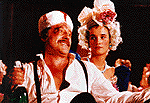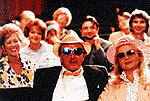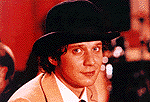
 114 Kbyte | In contrast to many others, Róbert Koltai is able to believe in popular
movie, in films of success - that is, entertainment -, and he is willing to
meet the expectations and challenges of this genre despised ever so often.
He knows quite well that the audience is thankful for getting comedies
featuring popular movie stars and themes which let you have an insight into
privacy some way or another. His first film hit which achieved great
success and evoked equally great debate among critics, We never die has
created a private mythology with its Uncle Gyuszi, then the series Patika
(Pharmacy) came for the television with similarly sound applause, while
cinemas have just presented his second feature film, Szamba. Szamba - it is light, like the Latin dance of the same name sweet-bitter, like the chocolate and goody-goody like Koltai. The former actor director, expecting the audience to be sensitive for pieces emerging from own experiences, leads them this time into the world of actors, which is extra special and full of light form the outside, but coming closer it shows a bitter, grey and cruel picture. Acting with professionals and amateurs, roadside play with barnstormers and enthusiastic amateurs... There is a through and through Hungarian theme, readily offering itself for entertainment to mature into success. The society of actors is always interesting, a scene worth of gossip and picking the juicy bits, but nobody before had it made seen like this. Countless true and false rumours were spreading on the murderous admission exams going on at the School for Dramatic Arts, plots being concocted in theatre buffets, on "Wirtschafts", and no here it is on the screen, moodily and entertaining in the style of the seventies, everything from mini skirts through imitation leather-armchairs in espressos to the trapezoid pants. Yet this is just the surface for Koltai is telling a true story with full heart from the actor who did not struggle, elbowed but stepped aside quietly for in fact he has never belonged to this world. True, it is generously let up to us how much we notice of his psychic conflict. The heroes of the film are father and son - Ottó Szamba Senior and Junior -, both of them touched by the aura of acting, though in a different manner. Szamba Sen. is devoting his time to Thalia as the cultural worker of a country town, that is he rather play-acts, blusters around, enchanting his populous mob of fans, while his son, Kisottó would best deny his father. Yet the boy finishes drama school and becomes an actor with a country troupe. Actors' dormitory, episode roles, loves, bitterness, a dusty, incremented troupe with stupid managers and ungifted artists- this is what surrounds him. The son gets stuck, plunges into the very depth of art, and without being noticed, quietly he steps out of life. Yet this is not tragedy, much rather a humorous-moody story directed in fact by the director-actor. Koltai-Szamba is quite a pair such as Koltai-Uncle Gyuszi, who dominate the screen by their personality or rather by their faith cast in their individuality and make us forget all the bitterness through their sound comedy. Koltai had to form the role of Ottó Szamba very accurately if he did not want his ego-centred film to become antipathetic for the audience. During harsh playing he had to arise sympathy using subtle tools for his hero quite fallible and rich in human weaknesses. Dwellers of the country town, the college and its teachers, the country theatre and its troupe, all and everything become secondary when Ottó Szamba enters the scene. Koltai however is knowledgeable enough to make it believe that it works fine like this and that he would take the lead in our interests. The essence is the same as it was in We never die. The story is not very well-turned, the script has not much plot, much rather characters, just this time there is not only one but two of them, the two Szambas: all the threads start from them, they have connections with all the players and of course, with each other. The Master is slightly the repetition of Uncle Gyuszi, but Kisottó (László Görög) is an extremely complicated figure. He is the opposite of his father from any aspects. He is talented, demanding against himself but he is lacking obsession. Neither the school not the country theatre let him really mature, he is unable to find himself and therefore he becomes a burden here as well as there. His aimless stubbornness is an exciting enigma for the viewer. It is a pity that the other players remain merely interesting patches of colour. They are evocative, conjuring up the world of the seventies, yet they are no more than puppets of a dusty wax-works. The similarly debutante actors, who give Kisottó up (Éva Kerekes, Zsolt László), the arty director (Pál Mácsai), the barnstorming ex-stars (Judit Pogány, Andor Lukáts, Judit Hernádi, Ádám Rajhona) would all give an interesting and remarkable slice of life should the director indeed trust in the magic of their personality and their tinged interpretations. Koltai wanted to tell his story in a humorous, sometime ironically and his effort is fully implemented. A merit of the film is that it sticks to its entertaining style consistently and it manages to lure a smile on the face of the viewers in those sad moments of bitterness. In this film no real tragedy can occur, as Uncle Gyuszi has to win at the horse race at least once in a lifetime. The images of the film radiate honesty and warmth. The work of Francisco Gózon as cameraman is remarkable, indeed. His shots show the distance between father and son touchingly, and they also delicately cast alight on the abyss between Kisottó and the troupe. The son is several times falling out of the angle of the camera or it passes over him. The medium has an excellent atmosphere, the harsh world of self-revelation and comedy. The angles serve as tools for "showing everything ", which can easily be amalgamated with the ironic approach. There is one scene in the film: Ottó Szamba Sen. gets into jail due to a "minor" economic mishap. His son who arrives to visit is received by great cheers by the wardens and escorted to his father who already established the amateur acting group of the prison and is just rehearsing for some festival. Kisottó is touched by the fanaticism of his father at this moment, but he says nothing just smiles. This short shot is more than a mere smile, however. It testifies some incredible endurance and very strong faith. Róbert Koltai has a faith cast into his vocation and this faith hopefully will last for him to stand behind the camera again and again and make a film for the audience to entertain. |
 99 Kbyte | |
 115 Kbyte | |
 100 Kbyte | |
 92 Kbyte | |
 76 Kbyte | |
 150 Kbyte |